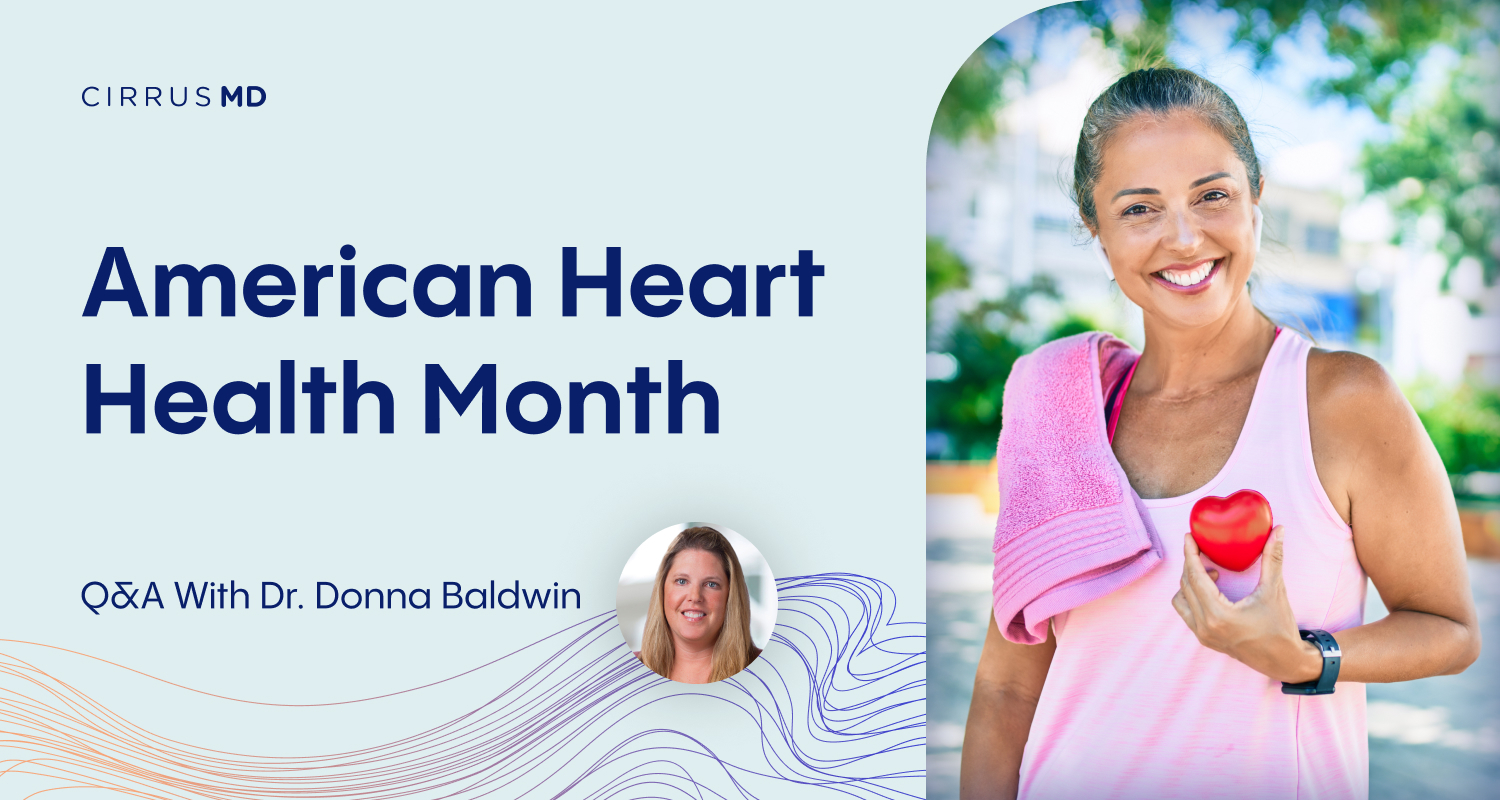Q: It’s American Heart month. What should people know about their heart health?
A: Heart disease is the #1 cause of death in the U.S.
Recent stats from the American Heart Association tell us that at least 48% of U.S. adults have some form of cardiovascular disease. Nearly HALF of adults in the US have hypertension; blood pressure of 140/90 mmHg or higher. Only 1 in 4 adults with hypertension have their blood pressure under control. Doesn’t sound like a positive scenario, does it?
What should we do to help improve heart health? First, we want to ensure people have access to quality care. On-demand access to a virtual primary care physician can really help. Second, I like to point people to the American Heart Association’s seven goals: eating a healthy diet, exercising regularly, avoiding excess weight, not smoking, and keeping blood pressure, cholesterol and blood sugar within a healthy range.
Q: If a person has a problem with heart health, will they know it?
Often they will not. Hypertension is known as the "silent killer" in adults, causing damage to organs, increasing risk of stroke and heart attacks without having any symptoms. High blood pressure and cholesterol (a risk factor for heart attacks and strokes) often go unnoticed because there aren’t any symptoms often until a patient’s blood pressure is really high. So, checking blood pressure and cholesterol regularly is important to reduce the risk of heart attacks and strokes.
Q: Why is it so important to manage blood pressure?
A: High blood pressure can cause strokes, heart attacks, and an overall risk of “overworking” a person’s heart, which can lead to chronic heart failure and even death.
Q: What shifts are you seeing in the home environment, specific to heart health?
A: We’re seeing more people using home blood pressure monitoring, which is a great trend in home care. It helps patients improve their hypertension because it’s so convenient. Patients can monitor their blood pressure more easily and often, and frequently with more accurate results, because they’re not feeling nervous sitting in a doctor’s office. Greater frequency helps us treat the pattern of numbers, so with home blood pressure monitoring, we have a bigger picture.
The takeaway is that a patient doesn’t have to see a physician in person to control their blood pressure. Home monitors are a great way to collect and record blood pressure that can then be reviewed with a provider.
Q: How do CirrusMD physicians help address patients’ heart health?
A: We’re currently conducting a study on how virtual care can improve high blood pressure outcomes by providing barrier free access to a physician. Our doctors can follow up regularly to help patients manage their high blood pressure and order labs, like cholesterol screening, to help patients understand and minimize their risk of heart disease.
Ongoing chats with a virtual primary care doctor gives patients the easiest access to care: reviewing blood pressure readings, making adjustments to medication, and helping improve control of hypertension and cholesterol. A virtual primary care doctor can even help a patient quit smoking, which is a high risk factor for developing heart disease.
Q: What can employers do to help their employees manage their heart health?
A: Employers can encourage employees to use virtual services like CirrusMD to help “know your numbers” and identify risk of heart disease. You can help employees through wellness programs and reminders for health screenings, which in turn can help avoid loss of productivity and increased sick days. Most importantly, your employees are living happier and healthier lives.
Q: Do women need to manage their heart health differently than men?
A: Heart disease is the number one cause of death in women, and in fact more women die of heart disease than men! Often the issues get worse because the symptoms are not evident, and women are not taking the time to do health screenings.
Again, employers can help by sending reminders to female employees, reminding them to reach out to a CirrusMD physician to schedule lab work or discuss what screenings are needed, or offering home blood pressure monitors or employee health fairs.
Q: This is such an important topic. During American Health month and throughout the year, what should people do to reduce their risk of heart disease?
To lower your chances of heart disease, follow this list of important steps:
- Know your blood pressure. Uncontrolled blood pressure can lead to heart disease. Learn more about high blood pressure.
- Talk to your doctor or healthcare team about whether you should be tested for diabetes. Having uncontrolled diabetes raises your risk of heart disease. Learn more about diabetes.
- Quit smoking. If you don’t smoke, don’t start. If you do smoke, learn ways to quit.
- Discuss checking your blood cholesterol and triglycerides with your doctor. Learn more about cholesterol.
- Make healthy food choices.
- Being overweight or obese raises the risk of heart disease. Learn more about overweight and obesity.
- Limit how much alcohol you drink to one drink a day. Learn more about alcohol.
- Manage stress levels by finding healthy ways to cope with stress. Learn more about coping with stress.
Remember that a CirrusMD virtual primary care physician can help your employees or plan members with these important health tips and screenings. Patients don’t have to see an in-person provider to address these risks.







